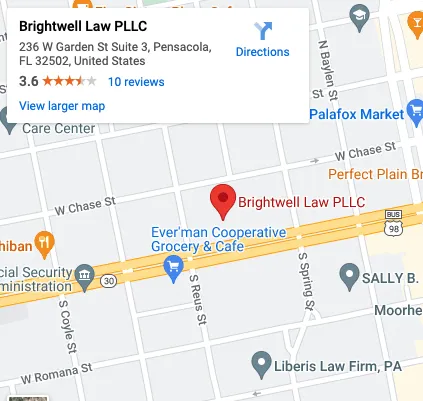Unraveling the Timeline: Your Guide to Divorce Duration in Florida
Embarking on the path of divorce can feel like stepping into a minefield, full of twists, turns, and unexpected roadblocks. “How long does divorce take in Florida?” is not just a question—it’s a reflection of the desire for clarity and resolution. While the journey’s duration can be influenced by various circumstances, the support of an experienced family law attorney can offer insights and smooth out any wrinkles along the way.
Brightwell Law PLLC has stood by Pensacola families, illuminating their path with knowledge and wisdom, ensuring no one feels lost or alone. Our experience in Florida’s unique divorce proceedings is your compass, pointing the way to a fair resolution.
Are you in need of legal guidance to navigate the divorce proceedings in Florida? Reach out to Brightwell Law PLLC now for a personal consultation.
Understanding the Divorce Process in Florida
Embarking on the path of divorce in Florida can feel daunting, primarily due to the legal procedures involved. But knowing what to expect can make the journey less intimidating. Let us review the initial steps of the divorce process to gain a clearer perspective.
1. The Initial Petition and Response
The first step in the Florida divorce process is filing the “Petition for Dissolution of Marriage.” This is where one spouse (the petitioner) states their reason for the divorce and what they’re seeking. The other spouse (the respondent) then has 20 days to respond. If they agree with everything in the petition, the process might be shorter. If they don’t, they’ll file a response, and this can lengthen the timeline.
2. Mandatory Waiting Period: What to Expect
The divorce process in Florida includes specific timelines established to ensure both parties have ample opportunity to voice their perspectives and potentially reconsider their decisions. The response time allows the respondent to seek legal advice, understand the implications, and decide on their course of action.
Separate from this response timeframe, Florida law mandates a “cooling-off” period. This is a minimum 20-day waiting period from the date of filing before the divorce can be finalized by the court. The intention is to give couples some breathing space to reflect on their decision and possibly explore avenues for reconciliation.
However, this cooling-off period is the minimum duration, and many divorces can take longer, especially if disagreements arise regarding assets, child custody, or other critical matters. So while the waiting period serves as a pause for contemplation, it’s essential to understand that the divorce journey might span beyond those initial 20 days.
3. Contested vs. Uncontested Divorce: The Time Difference
The trajectory of a divorce process in Florida often hinges on whether it’s contested or uncontested.
- Uncontested Divorce: In an uncontested divorce, both spouses find common ground on all terms, such as asset division, child custody arrangements, and alimony. This mutual agreement streamlines the legal process, allowing the divorce to conclude more efficiently, often within 4 to 6 weeks. It’s the path where collaboration overrules conflict, and the desire to move forward harmoniously takes precedence.
- Contested Divorce: On the flip side, a contested divorce is a different ball game. When spouses are unable to agree on one or more critical issues, the process can extend to six months, a year, or even several years.
Here’s what can complicate matters:
- Disputes over property division
- Disagreements on child custody
- Differing views on financial support
These issues often require mediation or even court intervention. Such cases involve thorough investigations, evidence presentation, and sometimes even expert testimonies. Consequently, a contested divorce can extend for many months, with some complex cases dragging on for years. It’s a testament to how individual disputes can shape the timeline and complexity of the divorce journey.
What are the Factors Influencing Divorce Duration?
While the distinction between contested and uncontested divorce sets a broad framework for the divorce timeline, specific elements come into play that can influence the duration. Delving deeper, some factors inherently add layers of complexity to the process, especially when financial intertwining is considered.
The Role of Marital Assets and Debts
Dividing marital assets and debts is not just a logistical challenge but can also be an emotionally charged endeavor. Shared properties, jointly held bank accounts, and common liabilities, like mortgages or credit card debts, become focal points of negotiation. When both parties are on the same page, this distribution can be straightforward.
However, if disagreements arise—perhaps due to differing views on contributions, entitlements, or the perceived value of certain assets—the process can elongate. Navigating this division requires careful consideration, accurate documentation, and sometimes, mediation to ensure a fair and equitable split.
Child Custody and Parenting Plans
Deciding on child custody isn’t merely a logistical concern; it delves deep into the emotional and psychological well-being of the kids involved. Parents aim to craft a parenting plan that prioritizes the children’s best interests, fostering stability and continuity in their lives.
Balancing this with ensuring that both parents get meaningful time and involvement becomes crucial. But arriving at this equilibrium is not always easy. Negotiations become essential, and if a middle ground remains elusive, court intervention might be the next step to ensure the children’s welfare is protected.
Mediation
Mediation is a common alternative avenue for resolution, offering a potentially faster path to agreement. In this process, a neutral third party, or mediator, steps in to guide discussions and facilitate understanding between the spouses.
Unlike a courtroom setting, mediation is less confrontational and more collaborative. It’s an environment where open dialogue is encouraged, and resolutions are crafted together.
While mediation might not be the right fit for all, especially in instances of deep-seated disagreements or distrust, it does present an opportunity to bypass some of the prolonged legal battles, thereby reducing both the time and emotional toll of the divorce journey.
Preparing for a Swift and Smooth Divorce Process
To navigate the tumultuous waters of divorce, preparedness is key. The more organized and informed you are, the smoother the process can be, minimizing unnecessary hiccups or delays. One such integral aspect of this preparedness revolves around the area of legal documentation.
The Importance of Legal Documentation
In the intricate web of divorce proceedings, the role of proper documentation cannot be overstated. Meticulously filled-out, accurately filed, and promptly served papers form the backbone of a smooth legal process. Any oversight, even a minor one, can cause complications, possibly extending the process and intensifying the stress for everyone involved.
Having an experienced and skilled attorney by your side during this time is invaluable. Their knowledge ensures that all paperwork adheres to legal standards, and they act as a guiding hand, leading you through the maze of necessary documentation. Their legal assistance can be vital in streamlining the divorce process, guaranteeing that every detail is addressed.
The Emotional Preparedness and Its Impact on Time
The emotional turmoil of a divorce often runs as deep as its legal intricacies. Beyond the legal battles and paperwork, there lies a landscape of feelings – from grief and anger to acceptance and hope. Preparing oneself emotionally is as crucial as any legal step in the process. By managing emotions, individuals can approach decisions with a clearer mind and a more focused purpose.
Being emotionally grounded allows for more objective discussions and can significantly reduce conflicts that arise from heightened sentiments. This not only alleviates personal suffering but can also expedite the entire process. When emotions don’t cloud judgment, decisions become more straightforward, potentially shortening the time span of the divorce proceedings. Having a support system, be it through counseling or close-knit groups, aids in this emotional readiness, facilitating a smoother transition through this challenging life event.
The Advantage of Having a Local Pensacola Attorney
When going through a divorce, having a lawyer who knows the ins and outs of the Pensacola court system can make a big difference. They’ll be familiar with how things work locally, from the court procedures to the people involved, like judges and clerks.
This local knowledge can speed up your divorce process and make it smoother. Your lawyer will know how to adjust their approach based on how things are done in Pensacola. These local tips can give you an edge, helping you avoid problems that someone not familiar with the area might not see coming.
Looking for Help with Your Divorce?
Navigating the complexities of divorce raises many questions, including “How long does divorce take in Florida?” At Brightwell Law PLLC, our skill in family law ensures you have the answers and guidance you need.
Our legal team is experienced in family law, making us your ideal partner in understanding divorce proceedings, custody battles, and more.
We also offer estate planning services to help you plan for your family’s future. If you need help with probate after a loved one dies, we can help with that too. And if you’re a landlord or tenant, we can help you with any legal issues you might have.
So, if you’re looking for comprehensive legal support, we are the law firm for you. Reach out to us at Brightwell Law PLLC today, where we offer tailored solutions for a wide array of legal needs.



